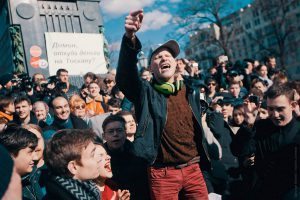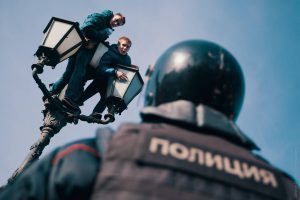Russian Student Uprising: For Liberty, Against Putin
The first generation to grow up under Putin seems to oppose his politics, as Sunday’s protests across the country show. And it was not all about Navalny and Medvedev.
Next year, Russia will be holding a presidential election and those born in 2000 will be voting for the first time in their lives. Tomorrow’s 18-year-olds were born when Vladimir Putin was already the head of state, they went to school during his second term and graduated under Putin as well. In other words, they have never seen any other person in charge of the country — except, well, Dmitry Medvedev, the current prime minister. But even teenagers are not naive enough to have any doubts as of who the real “tsar” has always been.
A week ago, an inspirational video hit the Russian blogosphere. A group of teenagers from a remote little town argues with their teachers about Putin’s domestic and foreign policy. One of their classmates had been questioned by the police for joining an online opposition group, and the teachers decided that some indoctrination would deter his peers from making the same “mistake”. After the students refuse to be brainwashed, the teacher frustratedly calls them superficial and narrow-minded and comes to the conclusion that there are “no patriots in the class”.
On Sunday, the 26th of March, thousands of high school and college students took to the streets in almost one hundred cities across the country to support the opposition leader Alexey Navalny in his struggle against corruption and in his presidential campaign. Nothing like that had happened since 2011-2012 when Russia faced the biggest pro-democracy demonstrations in its post-Soviet history. This unprecedented civil uprising five years ago did not result in a revolution, partially because the rallies were only visible in two big cities, Moscow and St. Petersburg. Hence, state-owned TV channels claimed that those who rallied represented the westernized “creative class” but by no means the whole Russian nation.
“Don’t look at Moscow, do it yourself”, Navalny called for action in 2017, after publishing an impressive documentary about Medvedev’s corrupt empire, and millennials cheered up. From Kaliningrad to Sakhalin, they started forming up grassroots movements and breaking the information blockade.
They were bullied at school, attacked physically, and blackmailed by local authorities. In many regions, the Sunday rallies were not officially “authorised” — taking part in a demonstration like that can get one in prison for several years. But today’s teens are too young to remember how a few dozen activists were sent to jail as a result of the 2012 uprising. Meet the new, fearless generation.
On the day of the protest, “Day X”, the state-owned media remained silent about the tens of thousands protesting all over the country. Later Putin’s spokesperson said that the young protesters had been promised money in case of their detention. As a matter of fact, they were. The only way to overcome the deepening economic stagnation, Navalny claims, is to put an end to a massive corruption among Russia’s top officials. The young protesters are well aware that they can only make money in Russia if Putin’s monopoly on everything, from the oil pipeline to the media channels, is over.
Despite the fact that it was an anti-Medvedev investigation that sparked the most recent protests, the fight is not against Medvedev, Putin’s caricature puppet who served as president until 2012. Although Navalny’s video collected 13 million views, there was hardly one person who truly expects that Medvedev’s resignation could endanger the regime. During his term, Medvedev was even seen by some as a an informal leader of the “liberal wing” of the government. Gradually, the civil society realised that he was just another particle of the same system.
I was among the first ones to realise this. In 2011, I was arrested for organising a student protest against Medvedev’s visit to the Moscow State University. His “meeting with students” was shamelessly staged as real students like me were replaced by pro-Kremlin youngsters. That story made Russians sceptical about Medvedev’s liberal-mindedness. The fact that in 2017 Medvedev is hated by so many Russians, means that illusions about the true nature of the regime are almost gone. After hundreds were arrested at anti-Medvedev rallies, including Navalny himself, his office robbed and his supporters charged with criminal offences, the last illusions are fading away.
But it’s not just a struggle for Navalny’s presidency. Navalny, the anti-corruption blogger who grew to be the hero of the streets in 2011, is probably not the best person to run the country and his political programme is eclectic to say the least (some of his promises contradict one another in an attempt to please the electorate). But Navalny is the best person able to challenge Putin’s monopoly. And the Kremlin is well aware of that — otherwise they wouldn’t start yet another criminal case against Navalny only few months after they lost the previous one at the European Court.
Thousands of young Russians from Kaliningrad to Sakhalin understand it, too. Next year, some of them will be voting for the first time in their lives. And, although they have only seen political competition in “House of cards” and some history textbooks, I now believe they will make the right choice.
Vera Kichanova is the first member of the Russian Libertarian Party to be elected into public office. After the Euromaidan Revolution, she moved to Ukraine to work with the Atlas Network. Currently, she is doing her Master of Public Policy at the University of Oxford. All pictures in this post are provided by George Malets.
This piece solely expresses the opinion of the author and not necessarily the organization as a whole. European Students For Liberty is committed to facilitating a broad dialogue for liberty, representing a variety of opinions. If you’re a student interested in presenting your perspective on this blog, please contact [email protected] for more information.


